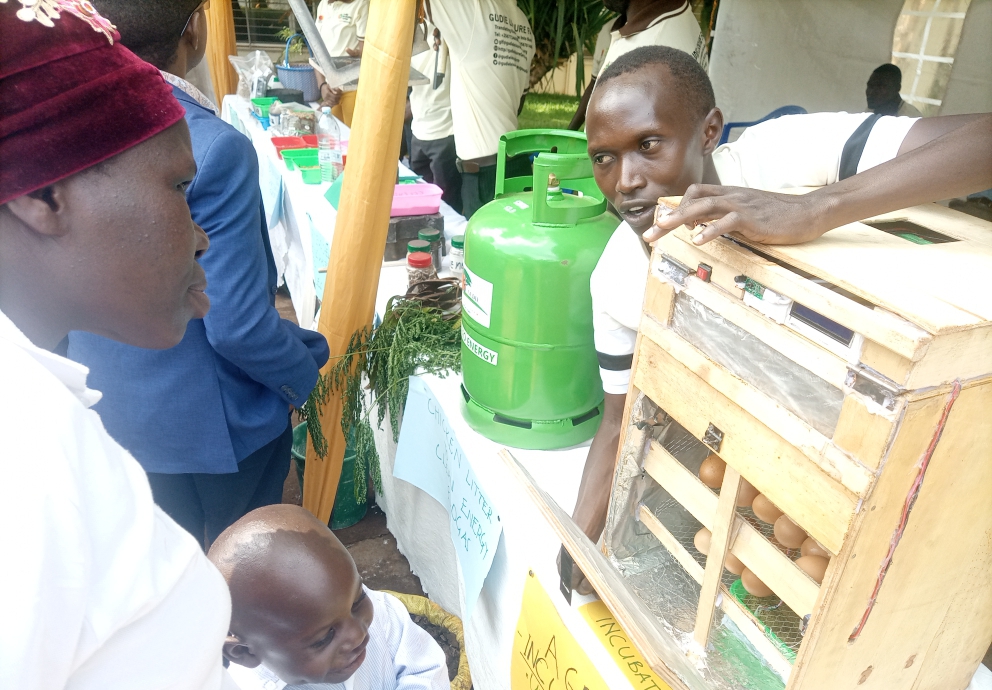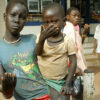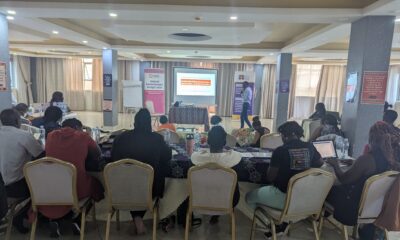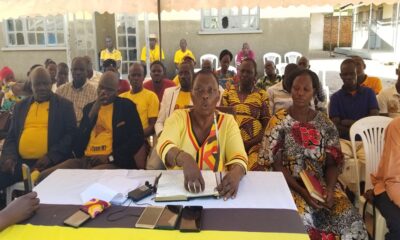News Feature
Young innovators with climate-smart ideas bring hope for poultry farmers

Jerome Amos (right):a member of Agro-Vision shows their version 1 Solar incubator at a recent exhibition held at MUZARDI Nov. 14, 2024
Five young Ugandans have been chosen to advance their scientific innovations and ideas with the hope that they can address challenges associated with climate change that face poultry farmers.
With financial support from the Science for Africa Foundation, the five lucky minds were selected from a team of 20 people that were chosen to be mentored under a project dubbed: “Greening the Chicken Value Chain”.
The project is spearheaded by researchers from the National Agriculture Research Organization (NARO) and one of its arms – Mukono Zonal Agriculture Research and Development Institute (MUZARDI) in collaboration with Gudie Leisure Farm (GLF) and the University of Burundi.
The project recently organized a competitive challenge for young people with ideas that can bring about climate-smart innovations in the poultry business.
The successful ones were awarded cash prizes to enable them advance their research projects to product stage or at least to a level that can attract investors.
Dr. Barbara Zawedde, the Director of MUZARDI said: “The poultry sector in Uganda is rapidly expanding, with chicken production serving as a critical income source and food security.”
“Despite this growth,” she added; “The chicken value chain faces pressing challenges, particularly at the production stage, which is increasingly affected by climate change. These impacts include erratic weather patterns, rising input costs, and waste management issues that compromise both productivity and environmental sustainability.”
In response to those challenges, Dr. Zawedde said that they conceived the ‘Greening the Chicken Value Chain Project’ to improve the productivity and profitability of the value chain players through the promotion of climate-resilient practices in chicken production with a special focus on the youth.
Briefs on the innovators
SmartKuku Brooder
Aaron Etyang, 24, conceived the idea of an automated electric system that could regulate temperature in a brooder.

Aaron Etyang stands behind two smart Kuku Brooder boxes he and his colleagues invented in 2023
This was in February 2023 during his third year at Mbarara University of Science and Technology (MUST).
Etyang connected a temperature monitor to a switch board that allowed it to automatically turn on and off within a specified temperature range.
Etyang hasn’t looked back since then. He put together a team of four colleagues that together successfully worked hard to bring the Smart Kuku Brooder to reality.
With an award of UGX 2.5M from the ‘Greening the Chicken Value Chain Project’, Aaron and colleagues have been empowered to conduct further research and make it even better.
Agro-vision’s Smart Incubator
The growth of the poultry industry can not be achieved without easing the incubation process for hatching eggs especially for farmers in upcountry areas.
Indeed, the bulk of the chicks on the market come from Kampala-based hatcheries and some even come from outside Uganda, which makes chicks rather expensive.
Thanks to some creative minds led by Jerome Amos, under their Agro-Vision brand, the fresh graduates from Mbarara University, have promised to make scarcity of incubators a thing of the past.
Agro-Vision drew applause last week at an exhibition at MUZARDI when they displayed their mini incubator that is equipped with a digital temperature monitor.
Luwemba’s Biogas purifier
Christopher Luwemba is a 19 year old Senior Six vacist. He conceived the idea of designing a biogas purifier in an attempt to make the renewable energy source more attractive by removing the smelly gasses that usually come with it.
Although his idea is still at concept stage, experts believe it has great potential to make poultry farming greener by enabling farmers to turn ammonia-laden litter into a useful cooking gas. By converting the ammonia contained in chicken litter, farmers would prevent the gas from escaping into the atmosphere where it causes global warming, it would also help to reduce deforestation by substituting wood or charcoal with a renewable biogas.
Desire Akankwatsa
Desire Akankwatsa, the only female innovator among the top five, seeks to enhance the protein content of Black Soldier Fly Larvae with a ubiquitous bacteria called Bacillus Thuringiensis.
Black fly larvae has gained traction as a potent source of protein supplement for chickens, since Dr. Emma Naluyima popularized them. The larvae are rared using biological waste usually collected from urban centres.
Briquette-man Balikowa
Brian Balikowa, a Masters degree student studying Bio chemistry at Makerere University, is seeking to develop briquettes using farm waste.
Given the presence of many such projects on the market already, Balikowa’s challenge is to make his innovation different from the rest.
Comments

























